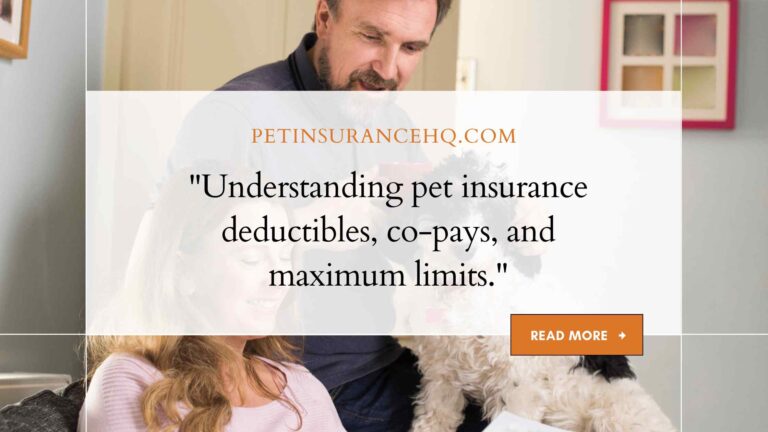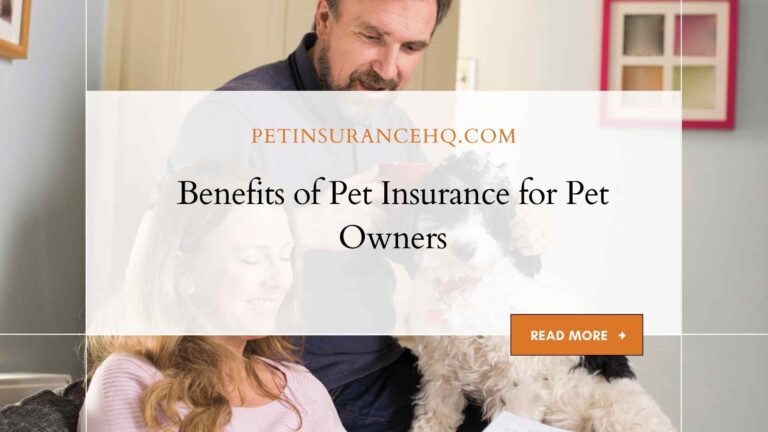How Pet Insurance Can Help Cover the Cost of Routine Care
Attention all pet owners! It is no secret that pets are an integral part of our families and bring immeasurable joy to our lives. From their playful antics to their unwavering loyalty, they truly hold a special place in our hearts. However, with great love comes great responsibility – the cost of caring for your furry friend can quickly add up. Routine check-ups, vaccinations, and preventative care can be costly but necessary expenses for pet owners. This is where pet insurance comes in as a helping hand!
In this blog post, we will explore how pet insurance can help reduce financial burdens and cover routine care expenses so you can focus on keeping your beloved pets happy and healthy without breaking the bank.
What is Pet Insurance?

Pet insurance is a type of insurance that helps cover the cost of your pet’s routine care. This can include things like vaccinations, routine check-ups, and prescription medications.
Most pet insurance policies will reimburse you for a percentage of your vet bills, and some will even cover pre-existing conditions. Some policies will also cover the cost of emergency care, should your pet need it.
While pet insurance isn’t required, it can be a valuable way to help offset the cost of your pet’s healthcare. And, if you have an unexpected veterinary bill, pet insurance can help relieve some of the financial stress.
For more information and to get a personalized pet insurance quote, you can visit petinsurance.com or speak with your local veterinarian.
Benefits of Pet Insurance
As a pet owner, it’s important to consider all the potential costs that come with owning a furry friend. One way to help cover these costs is through pet insurance. Here are some of the benefits of pet insurance:
- Pet insurance can help cover the cost of unexpected vet bills. If your pet becomes ill or injured, you’ll be glad you have insurance to help cover the sometimes costly veterinary care.
- Routine care costs, like annual vaccinations and teeth cleaning, are also typically covered by most pet insurance policies. This can help you budget for your pet’s health care needs and keep them healthy and happy.
- Some policies even offer coverage for things like boarding and grooming in case you need to go out of town and can’t take your pet with you.
There are many differentpet insurance companies and policies to choose from, so it’s important to do your research before choosing one that’s right for you and your pet. But with so many benefits,pet insurance is definitely worth considering for all pet owners.
Types of Pet Insurance Plans
There are three main types of pet insurance plans: third-party liability, accident-only, and comprehensive. Third-party liability pet insurance covers damages caused by your pet to other people or property. Accident-only pet insurance covers vet bills for injuries caused by accidents, like car accidents or dog fights. Comprehensive pet insurance plans cover both accidents and illnesses, as well as routine care, like vaccinations and teeth cleanings.
Choosing the right type of pet insurance plan depends on your budget and your needs. If you’re concerned about your pet causing damage to someone else’s property, third-party liability insurance may be a good option for you. If you’re worried about veterinary bills for accidents, an accident-only plan may be a better choice. And if you want the peace of mind that comes with knowing your pet is covered in case of an accident or illness, a comprehensive plan may be the best fit.
No matter which type of plan you choose, pet insurance can help you offset the cost of routine care and save you money in the long run.
How to Choose a Pet Insurance Plan
There are a few things to consider when choosing a pet insurance plan. First, you’ll need to decide if you want accident and illness coverage, or just accident coverage. Second, you’ll need to decide what deductible you’re comfortable with. Third, you’ll need to think about how much coverage you want for each incident. And finally, you’ll need to decide if you want a policy that covers preventive care or not.
Accident and illness coverage is going to be more expensive than just accident coverage, but it will also provide more comprehensive protection. If you have a healthy pet, then accident coverage may be all you need. But if your pet has any chronic health conditions, then accident and illness coverage is probably a good idea.
Your deductible is the amount of money that you have to pay out-of-pocket before your insurance policy kicks in. A higher deductible will mean lower premiums, but it also means that you’ll have to pay more out-of-pocket if your pet does have an accident or gets sick. So it’s important to choose a deductible that you’re comfortable with.
How much coverage you want for each incident will depend on how much your veterinarian charges for treatment. If your vet charges $500 for an emergency visit, then you’ll obviously want at least $500 in coverage per incident. But if your vet only charges $200 for an emergency visit, then $500 in coverage may be more than you need (and will end up costing you more in premiums).
Finally, you’ll need to decide if you want a policy that covers preventive care like vaccinations and checkups. Some policies only cover incidents where your pet is already sick or injured, while others will provide coverage for preventive care, too. If your pet isn’t at risk for any chronic diseases, then you may not need coverage for preventive care—but if your pet does have any pre-existing conditions, then it may be worth it to get a policy that includes this coverage.
How Does Pet Insurance Work?
Pet insurance works similarly to human health insurance in that you pay monthly premiums and are then reimbursed for covered veterinary expenses. Most pet insurance policies have an annual deductible that you must meet before the insurer starts to reimburse you, and then you are typically reimbursed 70-80% of covered vet bills. There are many different types of pet insurance policies available, so it’s important to do your research to find one that meets your needs and budget. Some things to consider when shopping for pet insurance include what type of coverage you need (e.g., accident only, illness only, or both), what veterinarian(s) you want to be able to use, whether you want coverage for routine care such as vaccinations and teeth cleaning, and whether you want a policy with no annual limits on payouts.
What Does Pet Insurance Cover?
Pet insurance policies typically cover the cost of routine veterinary care, including vaccinations, check-ups, and routine blood work. In addition, most pet insurance policies will cover the cost of emergency veterinary care. However, it is important to read the fine print of your policy to understand what is and is not covered. For example, many pet insurance policies exclude coverage for pre-existing conditions.
Tips for Finding the Best Policy
As a pet owner, it’s important to do your research when looking for the best pet insurance policy to fit your needs. Here are some tips to help you find the best policy for your pet:
- Decide what type of coverage you need. There are many different types of pet insurance policies available, so it’s important to determine what type of coverage you need before shopping around.
- Consider your budget. Pet insurance policies can vary greatly in cost, so be sure to consider your budget when choosing a policy.
- Get quotes from multiple insurers. Once you know what type of coverage you need, be sure to get quotes from multiple insurers before choosing a policy. This will help ensure that you’re getting the best deal possible.
- Read the fine print. Be sure to read the fine print of any policy you’re considering so that you understand exactly what is and isn’t covered under the policy.
Alternatives to Pet Insurance
There are a number of alternatives to pet insurance that can help cover the cost of routine care for your pet. One option is to set up a savings account specifically for your pet’s medical expenses. This way, you can save up for anticipated costs and have the money available when you need it. Another option is to purchase a policy with a higher deductible and co-payments. This can help keep premiums low while still providing some financial protection in the event of an unexpected vet bill. You could also consider investing in a health care rider on your homeowner’s or renter’s insurance policy. This type of coverage can help pay for veterinary bills if your pet is injured while on your property.
Conclusion
No matter what kind of pet you have, pet insurance can help cover the unexpected costs that come with owning an animal while also protecting your budget from financial shocks. With a policy like this in place, you’ll be relieved to know that if something happens to your beloved pet and they require medical treatment, even routine care bills will be taken care of without breaking the bank. Whether you need coverage for cats or dogs, Pet Insurance is worth looking into to give yourself the reassurance necessary should anything happen unexpectedly.






